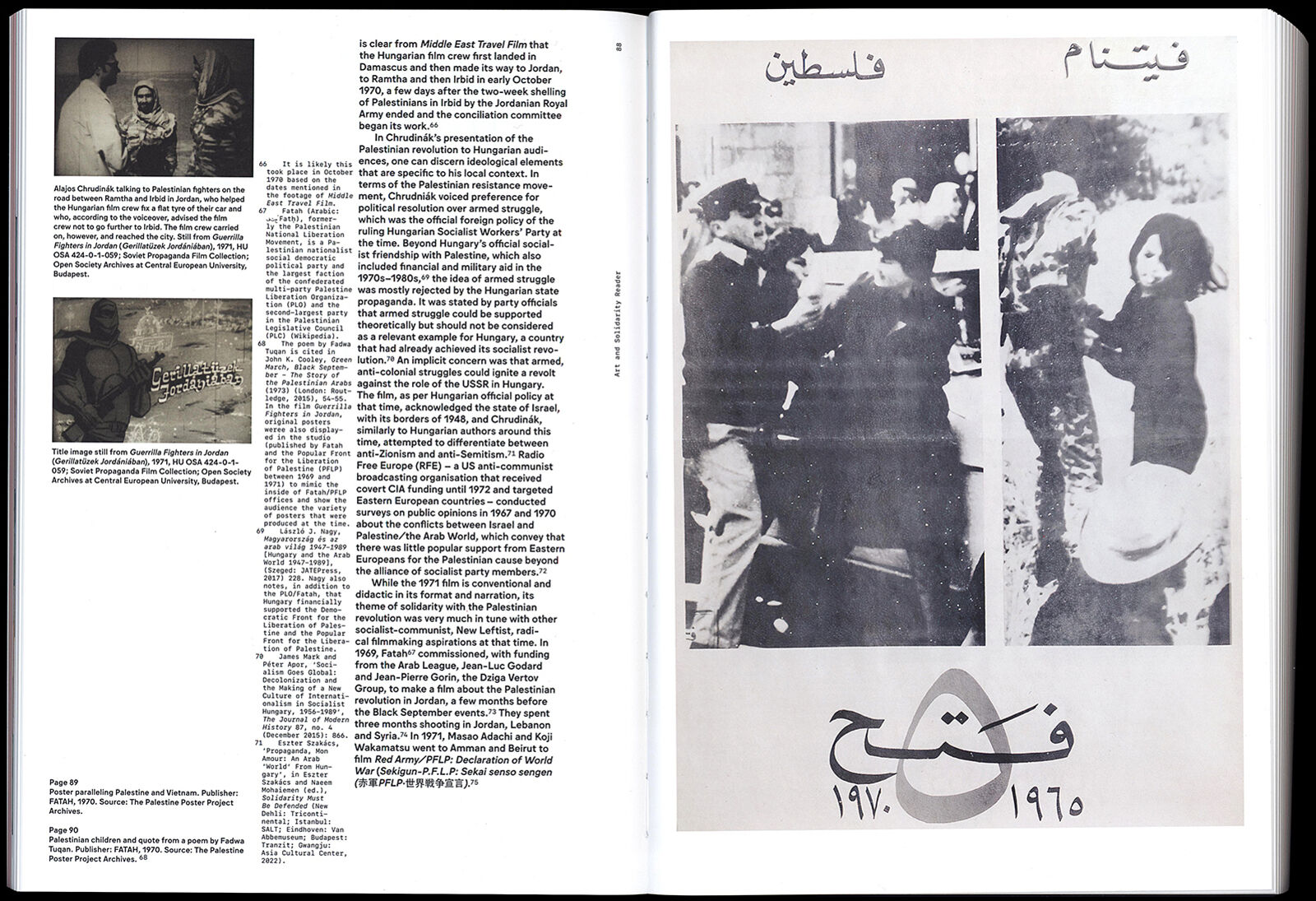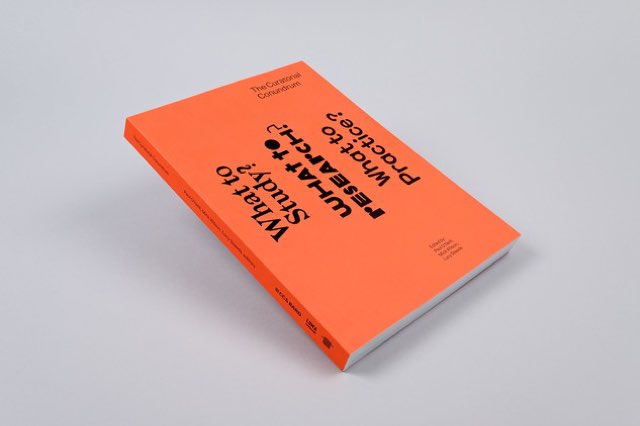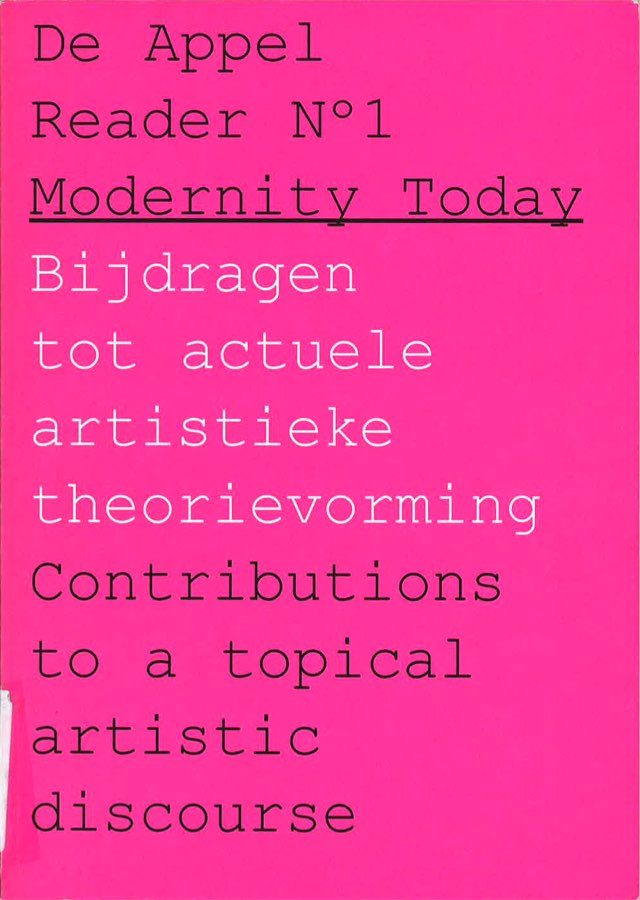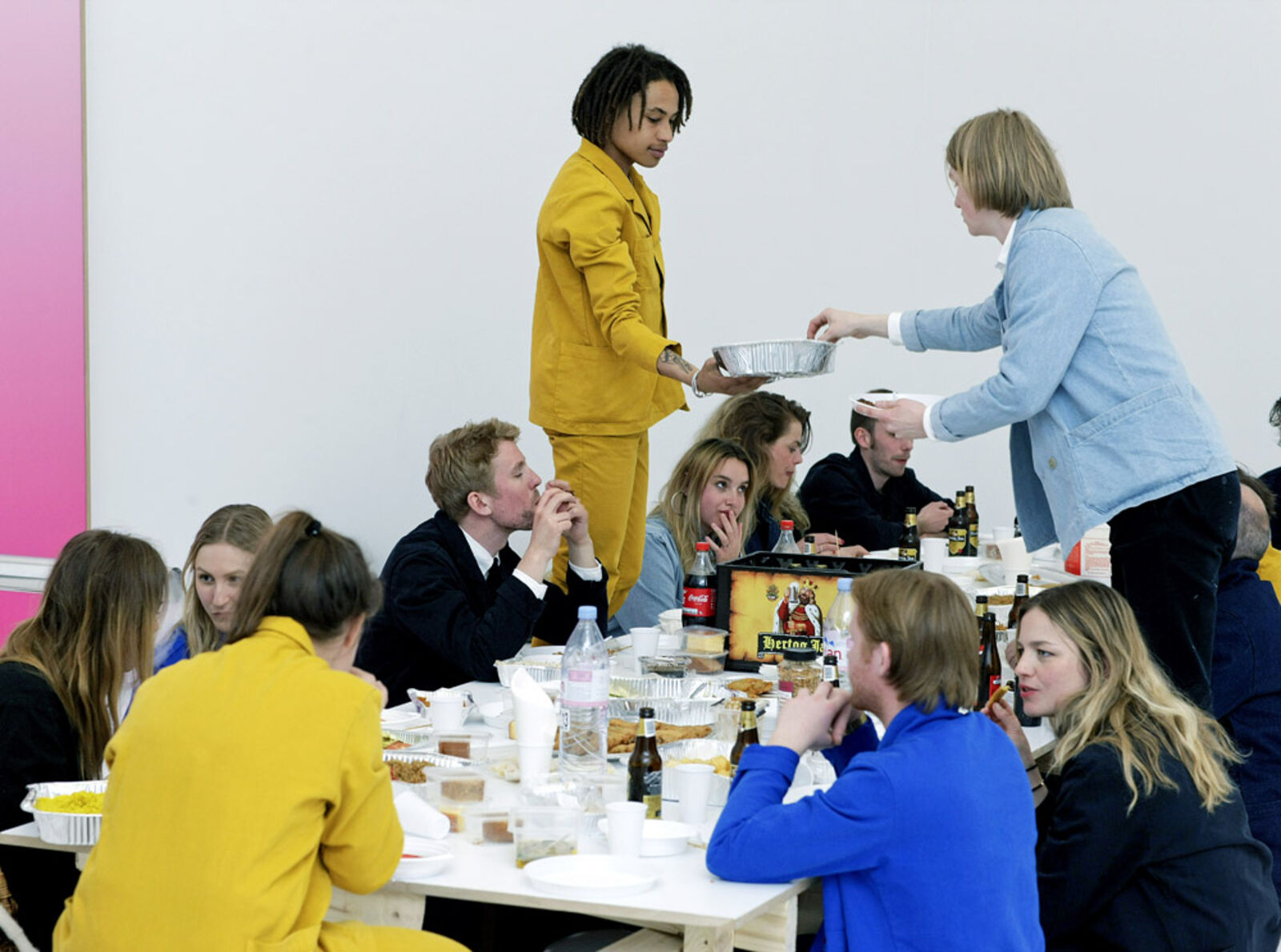Shaping Solidarity in the Arts: Booklaunch, Conversation and Soup
16:00–20:00
de Appel, Schipluidenlaan 12, Amsterdam

Spread from the article 'Ali in Jordan: Palestine Solidarity in Film' by Eszter Szakács, published in the 'Art & Solidarity Reader'.
Solidarity has grown to be one of the most frequently used rallying cries in the arts, connecting artists and activists in struggles against social and economic injustice, violent displacement, climate disaster, and other societal urgencies. Why is solidarity such a powerful and appealing ideal? What is the solidarity at play in these practices? Who is in solidarity with whom, and why? During Shaping Solidarity in the Arts, we will explore historical and theoretical dimensions of solidarity in the arts and connect them to practitioners’ perspectives. Together, we will develop a deeper understanding of what solidarity in the arts is, or could be.
This event is organized by Valiz, de Appel, and Platform BK. Speakers and facilitators include Eszter Szakács, Lara Khaldi, Mirror Soup Kitchen, collective Kukhnia, Rosa te Velde, Gizem Üstüner, Jue Yang, Radio Alhara, and Art Goss.
Please note: Everyone is welcome to join us for Shaping Solidarity in the Arts, however spots are limited. Please register via kantoor [at] platformbk.nl.This event will be in English. The Art and Solidarity Reader is available here.
Programme
16:15-16:30:
Welcome by the organizers Astrid Vorstermans (Valiz), Lara Khaldi (De Appel), and Sepp Eckenhaussen (Platform BK)
Astrid Vorstermans will present the book Art & Solidarity Reader published by Valiz in 2022.
16:30-17:00:
The collective Mirror Soup Kitchen (Jasper van den Berg, Jet Sanders and Roel Wouters) and activist artist collective Kukhnia (online, operating in Lviv) will cook and serve soup to everyone present. While the collectives and participants make sure together that everyone gets a meal, the collective will introduce their collaboration.
17:00-17:30:
Eszter Szakács in conversation with Lara Khaldi.
Both contributors to the Solidarity Reader, Eszter and Lara will critically discuss historical examples of art and solidarity as well as different models of institutional and non institutional forms of solidarity.
17:30-18:30:
What does solidarity mean to you? Table discussions on forms of solidarity.
During the meal, a conversation will be initiated around the question: what is the role and meaning of solidarity in your practice? These conversations will be facilitated by solidarity organizers from the Dutch arts. Notes will be taken by dedicated Harvesters.
18:30-19:00:
Our solidarity. Harvesters feedback & groups exchange.
The dedicated Harvesters report back on the conversations at their tables, and the results are discussed together.
19:00-20:00:
Radio/music and eating soup with a playlist from Radio Alhara.
About the organizers
Valiz is an Amsterdam-based independent publishing house in the field of art, theory, critique, design, and urban culture. Valiz has published the Art & Solidarity Reader: Radical Actions, Politics and Friendships, edited by Katya García-Antón, in collaboration with OCA, Office for Contemporary Art Norway. Shaping Solidarity in the Arts will be the book launch of this publication.
Platform BK researches the role of art in society, takes action for better art policy, and promotes solidarity in the arts. In September of 2022, Platform BK organized a three-day Solidarity Camp in collaboration with Casco Art Institute: Working for the Commons, Cultural Workers Unite, Engagement Arts NL, Fossil Free Culture NL, Tools for the Times, and Salwa Foundation. Shaping Solidarity in the Arts builds on lessons learned and friends made during this three-day event.
De Appel is a contemporary arts centre located in Broedplaats De Lely. De Appel makes time and space for artists and allies to pose vital questions. The meaning of solidarity is one of those questions. Lara Khaldi, the artistic director of De Appel, brings along experiences as a former member of the curatorial team of documenta fifteen and has contributed to the Art & Solidarity Reader.
About the Art and Solidarity Reader
Art and Solidarity Reader
Radical Actions, Politics and Friendships
Published by Valiz in partnership with OCA
Edited by Katya García-Antón
Solidarity has re-entered the global zeitgeist with resounding force in the last decades and is especially urgent to consider today. Yet this concept – both a potent ideal and a slippery notion – is one of the least analysed within the arts. Why? It is perhaps because colonialism, Neoliberalism, hyper-individualism and Western-centred concepts of art have eroded visions of a care-based society. Creating a fair and vital social fabric inspired by mutual dependencies between living beings and all entities including fauna, flora, air, land and water, is fundamental for our collective existence. A critical toolbox with intersectional perspectives is needed to examine this minefield and reveal meaningful and inspiring narratives that can guide our future.
Working with these complexities, this Reader considers the agency that artists, collectives and art institutions have generated from the 1970s to today to build the radical imaginaries of care and solidarity needed to transform the conditions of our collective existence in the face of local and global crises. Presenting new and historical material, the Reader narrates a series of stories of solidarity across geographies in relation to emergencies connected to ecocide, femicide, genocide, migration, neocolonialism, inter-religious conflicts, class divisions and heteronormativity, amongst others. It also gives a central place to Indigenous perspectives rarely considered when discussing solidarity in the arts.
About the participants
Eszter Szakács
Eszter Szakács is a curator, researcher, and Ph.D. candidate at the Amsterdam School for Cultural Analysis (ASCA) at the University of Amsterdam, where she is taking part in a project IMAGINART—Imagining Institutions Otherwise: Art, Politics, and State Transformation. Eszter is on the curatorial team of the grassroots art initiative OFF-Biennale Budapest, with which they were lumbung members at documenta fifteen. Together with Naeem Mohaiemen, she coedited the forthcoming anthology Solidarity Must Be Defended (tranzit/hu, Van Abbemuseum, SALT, Tricontinental, and Asia Culture Center). She was a team member of the East Europe Biennial Alliance—co-founded by OFF-Biennale Budapest—that collectively curated the Kyiv Biennial in 2021. Eszter worked as curator and editor at tranzit/hu in Budapest between 2011 and 2020. Her research and writing revolve around grassroots art organizing outside state art infrastructures.
Radio Alhara
Launched in Palestine at the very beginning of worldwide lockdowns in March 2020, online radio station Radio Alhara provides a platform for discussion, listening, and community-building. The name, which translates to ‘the neighborhood radio’, is reflective of the nature of the station itself: a close-knit community emerging from the margins, yet open and accessible to the world, bridging boundaries and geographic obstacles.
Mirror Soup Kitchen
Mirror Soup Kitchen mirrors a soup kitchen from a place hit by disaster or war. The recipes they cook there are prepared and served in exactly the same way, on the exact same day. The money raised will benefit this kitchen so it can continue to cook for those in need.
Currently Jasper Roel and Jet cook for as long as it takes for the activist artist collective Kukhnia residing in Lviv, Ukraine. They cook simple, vegetarian soups from home and distribute them to war refugees or other people in need. They now do this from 7 locations in Lviv.
Instagram: @mirrorsoupkitchen @kukhnia.lviv.
ART GOSS
Art Goss is a platform for high effort art gossip, founded in November 2020 by artists/writers L. Artimer & M. Gossamer. Art Goss publishes critical narratives and observations on institutions, structures, and phenomena within the Dutch cultural sector and materialises them through instagram, performance and exhibition making. Born out of the inequalities and institutionalised violences of the art world, Art Goss reclaims gossip as a force of legitimate, political knowledge production. Recent presentations include the performance Curriculum Veto at Het Nationale Theater, The Hague; the exhibition Curriculum Veto at Mistral Amsterdam; contributions to group shows and seminars at DAI, Fotodok, Frappant Galerie Hamburg, de Appel Amsterdam, Hotel Mariakapel, Institute for Network Cultures, Workspace Brussels, Kultursommer Hamburg, and others.
Instagram:@art.goss
Jue Yang
Jue Yang is an artist, writer, filmmaker and critic based in Rotterdam.
Gizem Üstüner
Performer and maker Gizem Üstüner graduated from the HKU in Utrecht. Her work addresses aspects of artistic work that usually remain invisible, such as stress about a visa, rejected funding proposals, imbalance of many side jobs, unwanted competition with colleagues, a tired acceptance of collective working tensions, and the unavoidable self-doubt about being insufficient as an artist while going through all this process. Gizem focuses on understanding and redefining these hidden dramas, making them visible and as important and valuable as the outcome of artistic work. Gizem has co-organized the Platform BK Solidarity Camp and is a co-founder of No.More.Later.
Rosa te Velde
Rosa te Velde is a researcher, designer, teacher, a mother and a daughter. From her maternal grandmother she inherited a great love for making things, sewing, knitting, building stuff, making maquettes/models etc. In 2019 she worked with Patricia Kaersenhout on the exhibition design of her monumental installation Guess Who's Coming to Dinner Too?, here at de Appel. After this, she continued her research into the histories of the building where de Appel is housed now, looking into the ways this building has lived through modernist dreams, segregation and gentrification. She is currently working on starting an amateur choir where resistance songs will be sung, starting from September on (just around the corner from de Appel, at Aslan Muziekschool). This is a project that is part of her work at the Amsterdam University of the Arts (AHK) where she runs a lectorate in Social Justice and Diversity in the Arts together with Aminata Cairo.



